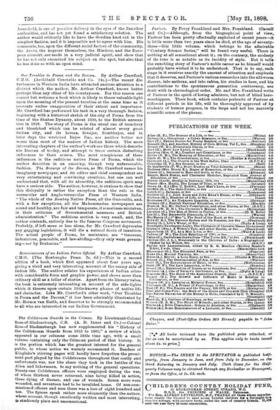Our Troubles in Poona and the Deccan. By Arthur Crawford,
C.M.G. (Archibald Constable and Co. 14s.)—The recent dis- turbances in Western India have attracted anxious attention to a district which the author, Mr. Arthur Crawford, knows better perhaps than any other of his countrymen. For this reason one cannot but welcome a book which is likely to throw valuable light upon the meaning of the present troubles at the same time as it prevents undue exaggeration of their extent and importance. Mr. Crawford has performed his task in a very thorough fashion, beginning with a historical sketch of the city of Poona from the time of the Shahee Dynasty, about 1500, to the British annexa- tion in 1818. The story of Poona is the usual one of treachery and bloodshed which can be related of almost every great Indian city, and its heroes, Siwajee, Sumbhajee, and in later days the wretched Bajee Rao, are neither better nor worse than most of the makers of Indian history. The more interesting chapters of the author's work are those which describe the Deccan of to-day, and attempt to trace certain disturbing influences to their source. The most conspicuous of these influences is the seditious native Press of Poona, which the author describes in an amusing, though very unfavourable, fashion. The Scourge of the _Deccan, as Mr. Crawford names his imaginary newspaper, and its editor and chief correspondent are very entertaining and convincing creations, but one can well understand that, with all its absurdity, the seditious spirit may have a serious side. The author, however, is anxious to show that this disloyalty is rather the exception than the rule in the vernacular and Anglo-vernacular Press of Western India. " The whole of the Bombay Native Press, all the Guzerathi, and, with a few exceptions, all the Ma hommedan newspapers are sound and healthy, are fair and temperate, if sometimes mistaken, in their criticism of Governmental measures and British administration." The seditious section is very small, and, the author contends, entirely due to the famous Congress movement. Probably, if left more or less alone, for Mr. Crawford deprecates any gagging legislation, it will die a natural death of inanition. The actual people of Poona, he maintains, are " timorous, industrious, peaceable, and law-abiding—they only want govern- ing—not by Brahmins."


































 Previous page
Previous page